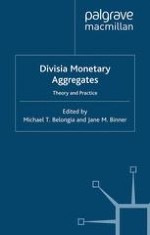2000 | OriginalPaper | Chapter
Divisia Aggregates and the Demand for Money in Core EMU
Author : Martin M. G. Fase
Published in: Divisia Monetary Aggregates
Publisher: Palgrave Macmillan UK
Included in: Professional Book Archive
Activate our intelligent search to find suitable subject content or patents.
Select sections of text to find matching patents with Artificial Intelligence. powered by
Select sections of text to find additional relevant content using AI-assisted search. powered by
Knowledge of money-holding behaviour in the private sector — that is, households and businesses — is of great importance for assessing the impact of monetary and other shocks on the economy, and the effectiveness of monetary policy. This, together with the fact that the theory of the demand for money is fairly well developed and with the required data readily available, explains why the demand for money has been so well explored econometrically. The underlying thought in all this work has been the belief that money demand should be stable (see Fase 1993, 1994). This chapter follows this research tradition but with a slight shift of emphasis away from econometric techniques and towards the substantial issues of considering various money concepts and geographical areas. Our main concern is the stability of money demand across geographical areas within EMU for various simple-sum versus index number, theory-based aggregates. Of these, the Divisia measure is a prominent example. As to geographical areas, we accept the view that Germany is the anchor country for EMUand should therefore have a relatively stable money demand vis-á-vis other member countries such as the Netherlands.
